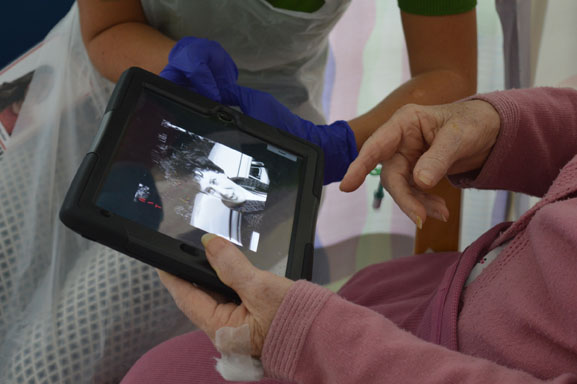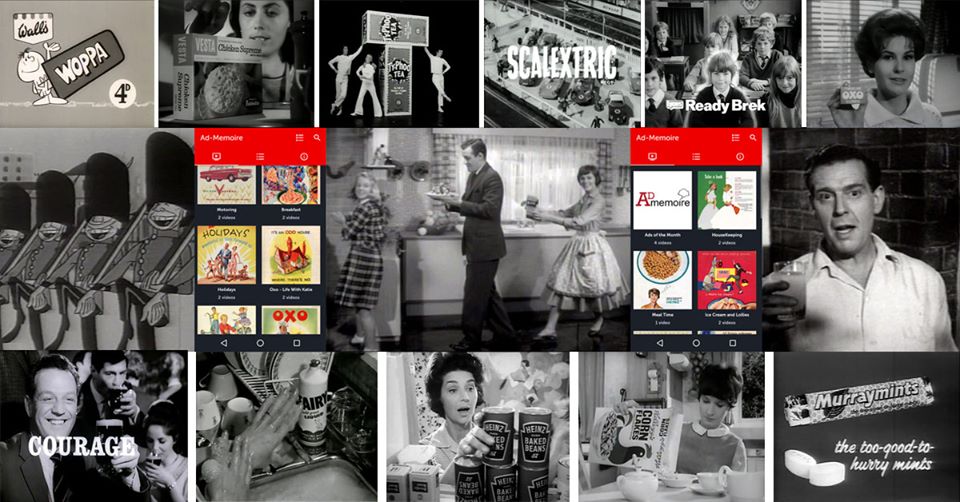“Without the free support of UEA’s postgraduates through the i-Teams programme, we would never have launched our Ad Memoire app, which is helping to enrich the lives of many older people and people living with dementia. The success of the project has transformed our work as a charity”
Alistair Moir, Deputy Director of the History of Advertising Trust
The History of Advertising Trust (HATs) is a charitable trust with the largest advertising archive in the world. Support from University of East Anglia (UEA) postgraduate students and researchers enabled the trust to launch a successful new app that is helping NHS and care staff to support older patients and residents, including those with dementia.

Alistair Moir, Deputy Director of the History of Advertising Trust, tells us:
“The History of Advertising Trust has an amazing collection of adverts, including half a million commercials from the 1920s to the present day. In the past, we had done a bit of work with a few hospitals and care homes, providing them with copies of vintage adverts to help staff prompt discussion with older patients and residents. As a result, we wondered whether we could expand on this work, but we weren’t confident that there was a market for this, or indeed how to proceed. And we lacked the resources required to conduct the necessary research.
“We were therefore delighted to be approached by University of East Anglia (UEA) and to receive free support in 2018 through the organisation’s i-Teams initiative. Under this scheme, a small team of postgraduate researchers spends three months working on a particular business innovation, which may include a regional heritage project. In our case, we asked the team to research whether our advertising archive could be shared more meaningfully with care homes, hospitals and older people, and if there may be benefits to people with dementia.
“The team from UEA undertook invaluable research, speaking to leading experts in dementia, including Dr Sarah Housden, Associate Professor in Health Sciences at the university. The researchers also spoke to a number of care homes and hospitals. The findings showed that there was a clear market for a resource that provides access to vintage commercials. Indeed, many health and care professionals couldn’t believe that something hadn’t already been developed! This gave us confidence that, in pursuing the initiative further, we wouldn’t be wasting our time.
“We learned that most older people, including those with dementia, can remember events that took place between the ages of 10 to 30 far more vividly than more recent events. Research shows that seeing vintage advertising can also help to improve someone’s wellbeing, as it tends to bring back happy memories.
“The i-Teams research showed that while the average age of someone in care is around 80, lots of care homes were still using items from the second world war (such as ration books) to prompt memories and discussion amongst residents. This period is actually bit too early for most care home residents, whereas the 1950s, 1960s and 1970s are a more memorable time for them.
“Crucially, we asked i-Teams researchers to look into the best way of making our advertising archive available. Based on further research, including discussions with health and care professions, they recommended that we create a digital tool, preferably an app. The feedback from care homes was that many residents had smart phones and tablets, and – even if they didn’t – activity coordinators could easily access this technology on their behalf to arrange group activities, bringing together residents to view vintage adverts. Given our limited resources we knew that we needed to make the initiative sustainable, and the research from i-Team showed that people would be prepared to pay a monthly subscription for a really useful resource.
“As a result of this, we worked with a local company to develop an app, which we called Ad Memoire. The content of the app is based on Dr Sarah Housden’s advice, with short reels of advertising films and images on a specific theme – such as housework, cooking or motoring. This supports group activities in care homes and hospitals, encouraging people to talk about their own memories and lives.
“Since launching it in 2019, we’ve had incredible feedback on Ad Memoire from care homes and hospitals. One of the unexpected benefits we heard is that the food and drink adverts can help promote appetite in people with dementia, so carers have been playing it before mealtimes.
“The app was launched a subscription service and is being used in a number of care homes. We’re delighted that we received funding to make it available to 100 NHS Trusts for free. Ultimately, our aim is to make the resource free to all care homes and NHS hospitals.
“The success of the app has actually broadened the History of Advertising Trust’s aims and objectives. Previously, we were just focused on education; we’re now also committed to providing resources to enrich the lives of people with dementia.
“We would never have got round to launching the app without the amazing – and free - support of UEA’s i-Teams initiative. The rigorous academic research gave us confidence to proceed, along with clear advice on how to do so.
“I know that there are many ways to benefit from UEA’s postgraduate research programmes, so – if you’re looking to make improvements or introduce innovations to your organisation – I’d urge you to get in touch with UEA to find out more.”

)